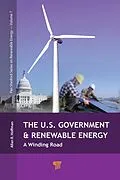This is a book on how the U.S. and other governments have changed their thinking about energy issues over the past four decades, a change triggered by increasing concern about the role of fossil fuels in global warming and climate change, greater awareness of the risks of nuclear power, and the emergence of viable renewable energy sources. It will help understanding of how this change came about in the United States from the unique perspective of a well-placed participant and observer. It will enhance understanding of the global energy transition that is finally getting underway in the second decade of the 21st century at an accelerating, even dizzying, pace.
Autorentext
Allan R. Hoffman holds a Bachelor of Engineering Physics degree from Cornell University and a PhD in physics from Brown University. Trained as an experimental physicist, he has devoted most of his career to the planning and management of clean energy technology programs in Washington, DC. He has served as a staff scientist for the U.S. Senate Committee on Commerce, Science, and Transportation and in senior positions at the National Academy of Sciences and the U.S. Department of Energy. Dr. Hoffman is a fellow of the American Physical Society and the American Association for the Advancement of Science.
